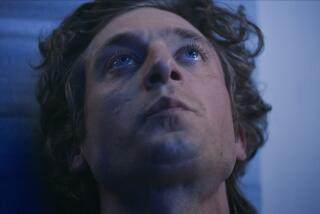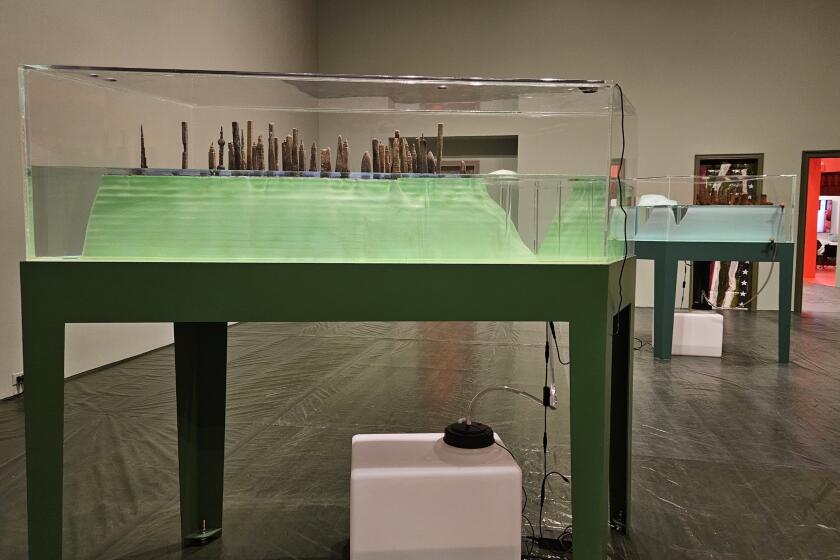‘Camp’ that’s all about the kids
To get a bead on Todd Graff and “Camp,” his generously felt directorial debut about a summer camp for underage musical theater performers, you need to know about the piano. When Graff was a junior at Purchase College in Purchase, N.Y., he decided to mount a production of “Jesus Christ, Superstar” with a 26-piece orchestra, a cast of dozens and himself in the role of Judas. The school didn’t seem to like Graff’s independence -- he made up his own program as he went along -- and although legally bound to fund the theater club he started, it adamantly refused to give him a piano for “Superstar.”
“So I went into the catacombs” beneath the campus, says Graff, “and took the concert Steinway grand that Emanuel Ax played. I said, ‘We’re going to steal this piano!’ I was too stupid to know you have to move a piano on a piano dolly.” So they pushed instead. “The legs buckled and it crashed, destroying the soundboard. We went down in flames.” The school kicked Graff out, but for years after, he says, claimed him as an alumnus and tapped him for money.
A former actor -- he was the guy with the pet rat in “The Abyss” -- Graff has written Hollywood movies (“Angie”) and polished numerous scripts (“Zoolander”). He doesn’t appear on the Purchase Web site with alumni like Edie Falco, but maybe “Camp” will put him back into the college’s good graces.
The piano story captures the wildly alive, highly excitable kid I knew when we were both at Purchase. Now 43, Graff grew up in Queens, N.Y., in a family of professional entertainers -- his parents were musicians and his sister is an actress. He sang in commercials as a child, providing the voice of Charlie in the Good & Plenty ads, and won an Emmy citation for the PBS children’s program “The Electric Company” before starting his freshman year. He wasn’t in any of Purchase’s conservatory programs and earned credit by any creative means necessary, like belting out Todd Rundgren in cabaret shows. His love for putting on a show could have come out of an old Mickey Rooney and Judy Garland movie -- with him playing Mickey and Judy.
When Graff was younger, that love found a perfect home at Stagedoor Manor in upstate New York, the children’s performing camp he attended with Robert Downey Jr. and Jennifer Jason Leigh. In his film, he calls the camp Ovation and, with a cast of talented unknowns, traces the ups, downs, performances and heartbreaks of the geeks and freaks he knew firsthand. These are kids who keep a framed photograph of Stephen Sondheim on their desk but wouldn’t know Justin Timberlake if he fell on their bed. Kids who spend most of the year hoping to make it to the next class without getting pummeled. Outsider kids, fat kids, gay kids, different kids -- kids who triumph eventually but in their first 18 years usually suffer.
Of course, the kids in “Camp” are also Graff. He had wanted to write a movie about the camp for years, but it wasn’t until he left Los Angeles and moved back to New York that he transformed that dream into a script. “I thought a lot about myself,” he told me at the Sundance Film Festival last January. “I divided myself up into a bunch of characters. We shot at the camp. The ghosts and the emotional detritus you trip over when you’re suddenly staging a scene in the room you slept in, re-creating something that was really painful for you ... “ He stops, searching for the words. “It’s one of the reasons there’s no resolution in the movie, because there was no resolution in my life.”
There’s no resolution in “Camp,” but there is a lot of exuberant hope. Crammed with music and adolescent comedy-drama, “Camp” is at once an entertaining musical and a smart riff on the classic summer-camp movie. But what tends to go unnoticed among the high and low notes and all the silly kids’ stuff is that it’s also a fresh addition to Queer Cinema. Here the emphasis isn’t on the high jinks of hormonally crazed straight boys peeking into the girls’ shower, but on hormonally crazed teenagers whose sexual desire -- gay, straight, bisexual and confused -- has yet to coalesce into a coherent identity. What makes it all the more unusual is that it’s a queer movie that kids can see on their own, since Graff cut some nudity to avoid an R rating.
“If I got an R rating,” he said, “every kid that I made the movie for can’t see it, or they have to go with somebody they can’t be themselves with.” That sense of being true to the kids, and taking their dreams and fears seriously, is why he kept his sharply honed sense of irony in check. Pop culture feeds kids a nonstop diet of ironic detachment and wholesale cynicism, but silly love songs aren’t remotely silly when you’re listening to them and crying your eyes out about being dumped.
“I was hoping to find a way for the kids to be true to themselves without compromising the openness of their heart,” said Graff. “They live in such irony 10 months of the year -- it’s their touchstone. I cut a speech in which one of the girls says ‘I have to believe I’m not going to be like this forever. I will grow into myself and I will have the world at my feet, but until then I’m not going to be alone and miserable.’ God knows there’s irony and caustic dialogue, but I really feel that the camp is this safe haven for kids who are at risk. I didn’t want to be ironic about it.”
One of the ironies of Graff’s own life now is that he had to leave Los Angeles to make the movie he wanted. When I caught up with him in 1994, a month before the release of the remake of “The Vanishing,” for which he’d written the script, he was living the good L.A. life. The scathing reviews for the film hadn’t hit, and he had written a movie for Madonna (she dropped out) and was writing a project for James Cameron (it never got made). Just as important, Graff had attended one of the Sundance laboratories and discovered he wasn’t ready to step behind the camera. It had been a terrific experience, he said, but “at this point in my life, I’d rather be the writer I want to be, which I’m not yet, rather than direct badly.”
Fast-forward to this past January and the Sundance Film Festival, where the once-reluctant director basked in audience adoration. Sundance can be a misleading place to launch a movie; audiences tend to be notoriously overgenerous, and industry insiders are loath to break any bad news. Still, everyone seemed high on the film’s sweet soulfulness, and a few critics shed visible tears. Since “Camp” opened, the reviews have been mixed but not bad. “It can be pokey and overly earnest and its dramatics are not always polished,” Kenneth Turan wrote in this paper. But “it plugs into the energy, skill and unapologetic joy of its young performers and doesn’t look back.”
At Sundance, Graff talked about leaving Los Angeles two years earlier. “I was not having the life I wanted to have,” he said. “It’s very isolating, and it wasn’t good for my relationship. It was a seductive trap knowing that any time I wanted to do a production rewrite I could and make a ton of money. Except that the movies get made, and you have to live with those movies. Time’s not going backward. I needed to get out and live downtown and make the movie I wanted. Maybe no one will see it. Maybe no one will care. It’s a cliche, but it’s what I needed to do, and it’s what I did. And here I am. It’s scary but it’s great.”
More to Read
The biggest entertainment stories
Get our big stories about Hollywood, film, television, music, arts, culture and more right in your inbox as soon as they publish.
You may occasionally receive promotional content from the Los Angeles Times.






